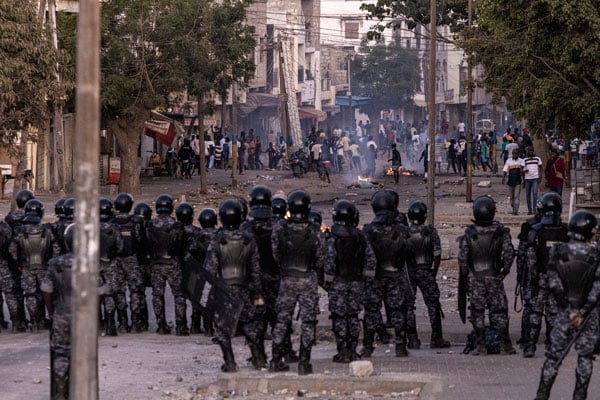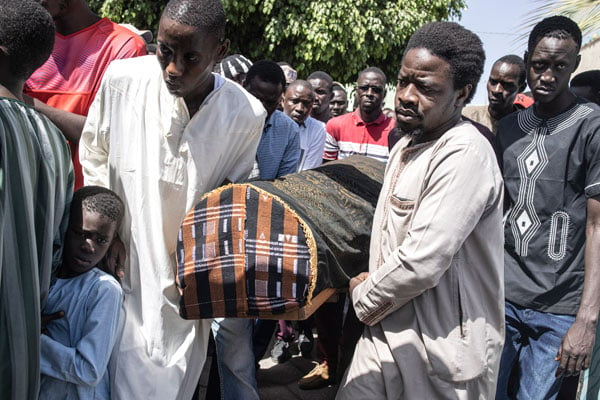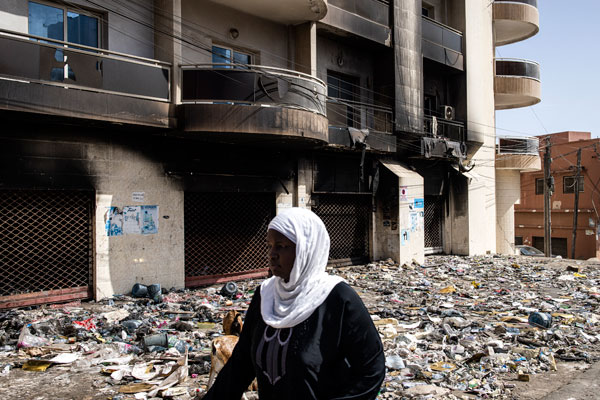Senegal faces tough questions after deadly violence

Senegalese Gendarmerie block a road after protests burned tires and blocked roads in Dakar, on June 3, 2023. PHOTO/ AFP
What you need to know:
- Violence has pitched the security forces against young supporters of opposition leader Ousmane Sonko, a firebrand speaker who accuses President Macky Sall of plotting to install a "dictatorship" at the apex of a corrupt elite.
- The violence left at least 16 people dead -- Amnesty International put the figure at 23 in a statement Thursday. Hundreds of other people were injured, and hundreds arrested.
Prized for decades as a tower of stability in turbulent West Africa, Senegal has been plunged into uncertainty after the deadliest episode in a two-year-old drama of political unrest.
Violence has pitched the security forces against young supporters of opposition leader Ousmane Sonko, a firebrand speaker who accuses President Macky Sall of plotting to install a "dictatorship" at the apex of a corrupt elite.
The picture is further confused by the suspicion that some people who took part in the recent unrest were simply looters with no political affiliation, out to grab what they could during the chaos.
Sall's response on Wednesday was to condemn the violence as an attempt to "sow terror and bring the country to a halt".
But he is resisting pressure to end his ambivalence over whether he will run in next year's presidential elections, a move his opponents say would breach Senegal's constitution.
Sall "has to make his position clear", said Abdou Rahmane Thiam, a politics professor in Dakar. "The issue is so divisive."
Sall was elected in 2012, when the presidential term was seven years, and re-elected in 2019 after the term was reduced to five years under a constitutional change.
Presidents cannot serve for more than two "consecutive" terms -- but Sall's supporters say the clock has been reset after the constitution was revised in 2016.
Questions are also being asked over what happened in the clashes that erupted on June 1, after Sonko was given a two-year sentence for "corrupting" a young beauty salon worker -- a conviction that will make him ineligible for the vote.
The violence left at least 16 people dead -- Amnesty International put the figure at 23 in a statement Thursday. Hundreds of other people were injured, and hundreds arrested.
Armed men
Each side accuses the other of using goon squads, either to attack demonstrators or -- according to the pro-Sall camp -- the security forces.
Ndery Ndiang, a lamb trader, said that in the Guinaw Rails Nord district on the outskirts of Dakar last Saturday he had witnessed a dozen armed men, dressed in civilian clothes, get out of a white pickup truck.
"They had a list of names of young people who they said were among the protestors, and they went after them."
Another witness who confirmed his account asked not to be named. "I'm afraid," he said. "There are informants."
A young man interviewed in hospital after being shot in the leg in Pikine, a flashpoint district, said he had been passing by in a cart when he saw about 10 men "with guns or knives" chasing protestors.
He said he was shot by a man subsequently identified as a wrestler -- a popular sporting group identified in the past as having provided muscle in political showdowns.
Amnesty International's regional director, Salmira Daoud, said the group was sifting through videos of such incidents.
But the armed men "often act alongside or under the eyes of the security forces", she said.
Interior ministry spokesman Maham Ka said that some policemen had gone undercover in their duties, but "I don't know these people in the pickup trucks.
"I cannot confirm whether they work with the police."
Arrest flashpoint
The government on Wednesday announced it would launch "immediate judicial inquiries" into the unrest.
It made a similar pledge after at least 12 people died in an outbreak of violence in March 2021 when Sonko was charged. The outcome of that inquiry is still awaited.
Now fears are growing of a fresh outbreak of violence once police take him into custody.
Sonko's conviction was the outcome of a two-year case for rape charges that transfixed the country, triggering sporadic unrest that had already claimed a dozen lives.
An outspoken critic of the current regime, he insists the case was cooked up against him to stop him running for president next year.





